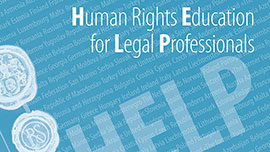Speech by Tatiana Termacic
Launch of the Horizontal Facility for Western Balkans and Turley
Belgrade, 2 March 2017
Ladies and Gentlemen,
I am pleased to introduce the Action entitled “Supporting effective legal remedies and mutual legal assistance”. Before describing it, I would like to recall that, just like other Actions, it is part of the unique mode of operation of the Council of Europe, which we call sometimes “Virtuous Circle”. That is, an interconnected sequence of standard setting, monitoring of implementation of these standards and co-opertaion with member states in order to help them to overcome difficulties in implementing the standards. In this regard, the approach suggested by the EU during the preparation of the Facility, when each component of each Action is clearly linked to specific recommendations, follows this approach.
The availability and effectiveness of domestic legal remedies has been addressed in a number of projects implemented by the Human Rights National Implementation Division, and a substantial wealth of expertise has been accumulated to provide best practices and possible models.
Indeed, the support provided by the Council of Europe is being based on the member states’ concrete needs identified by the different bodies of the Organisation, including as regards the adoption of new remedies or the improvement of existing domestic remedies. This is done through cooperation projects in which the CoE brings its experience and expertise to improve and increase the capacity of institutions, with the ultimate aim that the ECtHR will recognise them as effective remedies. In this particular area, the Council of Europe is mainly supporting Constitutional Courts, the Judiciary, including High Courts and Prosecutors’ Offices, Ministries of Justice, Ombudsperson institutions and national training institutions for judges and prosecutors. The overall purpose to support human rights at the national level is to enable citizens to effectively claim their rights domestically.
In Serbia, the Council of Europe has just finished the implementation of the project "Human Right Friendly Judiciary" (January 2016-December 2016) which worked on structural changes in the judiciary regarding the aspect "ensuring justice". The current Action will build upon the achievements of that project, which targeted the system of reasoning applied in national courts judgments and changes to certain routine practices. The aim of that project was to ensure harmonisation of the national case law with the case law of the ECtHR through well-reasoned decisions.
The origin of the current Action stems both from the requirements for Serbia under Chapter 23 of the EU acquis and its obligations under the ECHR. The component on effective domestic remedies relies on the relevant provisions of the Government’s Action Plan which states the necessity to improve consistency of jurisprudence through judicial means. In particular, it mentions the necessity to amend the normative framework which regulates the right to legal remedy and the ways legal remedies are decided upon. In addition a number of ECtHR judgments, notably Alisic and others v. Serbia, highlighted the insufficiency of domestic remedies for human rights violations available in Serbia. All this is connected to the issues of publication of judicial decisions and reasoning of judgments, elements to be addressed under the Action.
The Component on Mutual Legal Assistance will mostly deal with building the capacity of judges and prosecutors to address the complex issue of trans border legal co-operation. The Council of Europe has a proven track record in supporting member states to improve post-war justice and mutual legal assistance in relation to the findings made by the ECtHR, and the recommendations of the Department of Execution of ECtHR judgments and Council of Europe monitoring bodies, such as CPT and the Commissioner for Human Rights. The CoE introduced effective and sustainable training methodologies in its work with its Serbian partners under the umbrella of the European Programme for Human Rights Education for Legal Professionals (HELP), which can be adjusted to both legal professionals and enforcement officials. Co-ordination, synergy and complementarity with existing, recently finalised and pending projects of other Organisations will be ensured.
The overall Objective of the current Action is to improve the enjoyment by people under the jurisdiction of the Republic of Serbia of their human rights, through access to domestic remedies and better mutual legal assistance.
Specific objective 1 is to reduce systemic violations of human rights and support the provision of effective domestic legal remedies, and it is planned to be achieved through the following expected results:
- The co-operation and coordination between authorities and legal professionals on how to prevent systemic human rights violations and facilitate effective remedies is enhanced;
- The capacity of the Judicial Academy to support legal professionals in addressing systemic human rights violations is strengthened;
- The capacities of legal professionals, including judges, prosecutors, lawyers and legal assistants, to apply the provisions of the European Convention on Human Rights and the case law of the European Court of Human Rights is reinforced.
Specific objective 2 is to strengthen mutual legal assistance, and the expected result is that the Judicial Academy’s capacity to provide training to legal professionals on mutual legal assistance is enhanced through training and application of the methodology developed under the HELP Programme.
The key activities will include a comprehensive comparative study on the best regional practices to address the issue of insufficiency of domestic legal remedies; training activities for judges and prosecutors in co-operation with the Judicial Academy using the HELP methodology. A number of new HELP materials will be developed to address the beneficiaries’ needs.
The overall envelope of the Action is €650 000, it will last for 18 months, until 15 July 2018. This is an ambitious initiative. At the same time we trust that synergies within the CoE and with international actors operating in Serbia, will allow for a successful Action for the benefit of the whole Serbian society.




